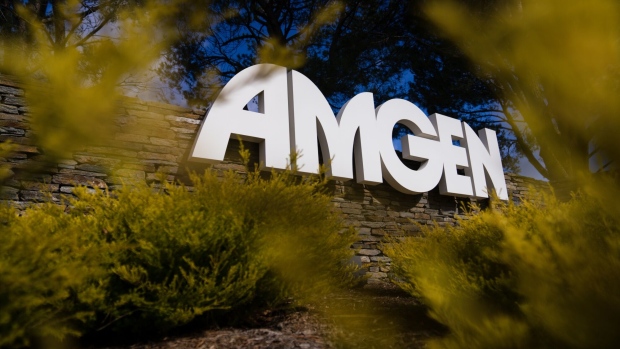Oct 31, 2023
Amgen Raises Revenue Guidance After Closing Horizon Purchase
, Bloomberg News

(Bloomberg) -- Amgen Inc. declined after its sales guidance failed to impress some investors, and the drugmaker ended the development of a cancer treatment.
The company raised the top end of its revenue outlook for this year by about $1 billion to $28.4 billion. That increase came after closing the purchase of drugmaker Horizon Therapeutics earlier this month, which brings rare disease drugs into the company’s portfolio.
The sales guidance topped Wall Street projections, but Jefferies analyst Michael Yee said some estimates may not have included the additional revenue from Horizon for the remainder of the year. When adding Horizon’s expected performance, Amgen’s guidance was “in-line,” he said.
Amgen declined to say how much of the increased forecast was from the Horizon deal. In the quarter before the acquisition closed, Horizon generated sales of $945 million.
“As expected, Amgen revised its 2023 guidance to reflect the Horizon transaction,” Yee wrote in a note to clients. “Looks mostly in-line with expectations.”
The shares of the Thousand Oaks, California-based company declined 4% at 11:08 a.m. The stock had gained less than 1% this year through Monday.
Cancer Drug
Amgen also disclosed that it halted the development of an experimental prostate cancer treatment, known as AMG 340, that was in the first stage of drug development. On a call with analysts, David Reese, executive vice president for research and development, said that the program was stopped based on clinical data.
The discontinuation of the treatment resulted in a $650 million impairment charge. In an interview, Chief Financial Officer Peter Griffith said that Amgen was prioritizing a different prostate cancer drug, xaluritamig, which is also in early-phase testing.
In the third quarter, adjusted earnings were $4.96 a share, Amgen said, while analysts had estimated $4.68 a share. Analysts attributed the profit beat to lower-than-expected expenses and taxes in the quarter. Revenue of $6.9 billion was in line with analyst expectations.
Amgen’s looking to Horizon, which it acquired for about $28 billion, to boost growth. Its rare disease drugs will serve as a “fourth leg” of Amgen’s business, alongside inflammation, oncology and general medicines, Chief Executive Officer Robert Bradway said on the call. Now that the companies are integrated, Amgen can use its global presence to advance and promote Horizon’s drugs more widely, especially Tepezza, the company’s best-seller for thyroid eye disease.
“While we see a lot of positive trends in the US, we’re pretty excited about what we can do as a combined company for patients outside the US as well,” Vikram Karnani, who leads Amgen’s rare disease business and joined from Horizon, said about Tepezza on the call.
©2023 Bloomberg L.P.


